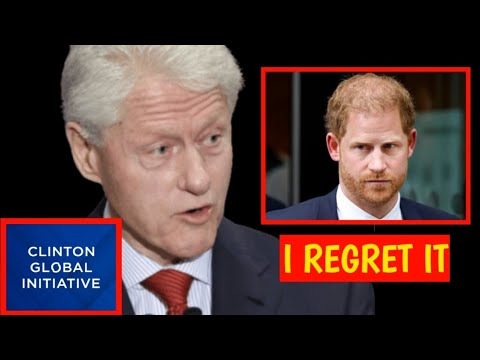Former President Bill Clinton announces it was a mistake to invite Prince Harry to the Clinton Global Initiative annual meeting.
In a surprising twist that has sent shockwaves through both the royal and political arenas, former President Bill Clinton recently revealed that inviting Prince Harry to address the upcoming Clinton Global Initiative (CGI) annual meeting was a mistake. This announcement comes on the heels of overwhelming public backlash, leading to Harry’s name being removed from the prestigious lineup of speakers. The implications of this decision resonate far beyond the confines of a single event, sparking conversations about celebrity influence, public perception, and the evolving nature of global leadership.
The CGI, founded by Bill Clinton in 2005, has long been recognized as a platform for leaders from various sectors to discuss pressing global issues such as climate change, poverty alleviation, and public health. Over the years, it has attracted an impressive roster of speakers, including heads of state, business leaders, and celebrities. The initiative aims to foster collaboration and inspire innovative solutions to some of the world’s most challenging problems.

Given this context, Harry’s inclusion in the CGI lineup seemed like a natural fit at first glance. As a prominent figure advocating for mental health awareness and social justice, the Duke of Sussex’s presence was anticipated to attract attention and potentially mobilize support for various initiatives. However, the decision quickly became controversial.
News of Prince Harry’s invitation to speak at the CGI sparked significant outrage among various factions of the public. Critics quickly voiced their concerns over the relevance of a royal figure addressing global issues, especially given the couple’s recent media ventures and perceived distance from the very challenges they aim to address.
Many questioned whether Harry, who has often been criticized for his privileged background, could genuinely relate to the struggles faced by everyday people. Social media platforms became battlegrounds for opinions, with hashtags like #NotMyPrince and #RoyalPrivilege trending as users expressed discontent with the idea of a royal addressing serious global issues. Some argued that it undermined the purpose of the CGI, suggesting that the platform should be reserved for individuals who have firsthand experience with the challenges being discussed.
In response to the growing backlash, Bill Clinton took to social media to clarify his position. He expressed regret over the decision to include Prince Harry, stating that it was made without fully considering the potential public reaction. His statement emphasized the importance of authenticity and relatability in discussions about social issues:
“While Prince Harry has made commendable efforts in advocating for mental health and social justice, I recognize that his association with the royal family may not resonate with everyone. I hope to foster a platform that represents a diverse array of voices, and I acknowledge that this decision has not aligned with that goal.”
Clinton’s admission that it was a mistake to invite Harry reflects a growing awareness among public figures about the delicate balance between celebrity and genuine advocacy. In a time when authenticity is more valued than ever, the disconnect between Harry’s royal background and the realities faced by many can be jarring. The situation raises important questions about the role of celebrity in advocacy.
In an age where social media amplifies voices, individuals like Harry and Meghan Markle have leveraged their platforms to address critical issues. However, their royal status often complicates public perception. Many people find it difficult to reconcile their advocacy efforts with the privileges they enjoy, leading to skepticism about their intentions.
The growing backlash against Harry’s invitation is emblematic of a broader trend—an increasing demand for accountability from public figures. The public is no longer willing to accept surface-level engagement; they want to see genuine commitment and understanding of the issues at hand. This scrutiny is particularly pronounced for those in the royal family, who are often viewed as out of touch.
For Prince Harry, this incident serves as a reminder of the challenges he faces in navigating public perception. After stepping back from royal duties, he and Meghan have attempted to carve out a new identity focused on philanthropy and mental health advocacy. However, their past and the media narrative surrounding them continue to shadow their efforts.
The withdrawal of Harry’s invitation from the CGI could have lasting implications for his public image. While he has garnered support for his advocacy work, incidents like this can quickly shift the narrative, leading to a perception of irrelevance or insincerity. Rebuilding trust with the public is no easy task, and this setback may have far-reaching consequences for his future endeavors.
As the CGI prepares for its annual meeting, the decision to exclude Harry raises questions about the event’s future direction. Will the CGI continue to invite high-profile figures, or will it shift its focus to grassroots leaders who can provide a more authentic perspective on global challenges? Clinton’s acknowledgment of this controversy signals a potential pivot toward inclusivity and relatability, which could redefine CGI’s approach moving forward.

